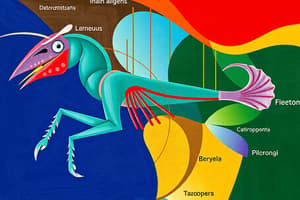Podcast
Questions and Answers
The scientific name is composed of the ___ and ____
The scientific name is composed of the ___ and ____
Genus and Species
What is the descending order for the modern classification system (7 taxa level)?
What is the descending order for the modern classification system (7 taxa level)?
Domain>Kingdom>Phylum>Class>Order>Family>Genus>Species
Who is the father of modern-day taxonomy and what contribution did he make?
Who is the father of modern-day taxonomy and what contribution did he make?
Linnaeus and came up with the 7 taxa levels of classifications
What are organisms that are unicellular, motile, and have chloroplasts called?
What are organisms that are unicellular, motile, and have chloroplasts called?
What is used often to classify organisms into kingdoms?
What is used often to classify organisms into kingdoms?
What is the scientific name for humans?
What is the scientific name for humans?
What kingdom included Archaebacteria and Eubacteria?
What kingdom included Archaebacteria and Eubacteria?
What category of classification is Escherichia?
What category of classification is Escherichia?
An important feature of modern classification systems is that they__?
An important feature of modern classification systems is that they__?
The body of which of these organisms has the least specialized organization?
The body of which of these organisms has the least specialized organization?
An organism that is multicellular, does not carry on photosynthesis, and absorbs nutrients from the environment. Which kingdom would the organism be classified?
An organism that is multicellular, does not carry on photosynthesis, and absorbs nutrients from the environment. Which kingdom would the organism be classified?
Study Notes
Taxonomy and Classification
- Scientific names consist of two parts: Genus and Species.
- Modern classification is structured hierarchically with levels: Domain, Kingdom, Phylum, Class, Order, Family, Genus, Species.
Historical Contributions
- Linnaeus is recognized as the father of modern taxonomy, establishing the seven taxonomic levels for organism classification.
Organism Characteristics
- Protists are unicellular organisms that are motile and contain chloroplasts.
- The Monera Kingdom includes prokaryotic organisms such as Archaebacteria and Eubacteria.
- Escherichia is classified under the Genus category.
Classification Criteria
- Structural features are essential for categorizing organisms into distinct kingdoms.
- An organism that is multicellular, non-photosynthetic, absorbs nutrients, and has eukaryotic cells with cell walls is classified in the Fungi Kingdom.
Scientific Evolution
- Modern classification systems are dynamic and can adapt to incorporate new scientific discoveries.
Organizational Simplicity
- Among organisms, sponges exhibit the least specialized cellular organization.
Human Classification
- The scientific name for humans is Homo sapiens.
Studying That Suits You
Use AI to generate personalized quizzes and flashcards to suit your learning preferences.
Description
Test your knowledge on the classification system in biology with these flashcards! Covering key concepts like the scientific naming convention and the contribution of Linnaeus, this quiz will solidify your understanding of the 7 taxa levels. Perfect for students or anyone looking to refresh their biology basics!




